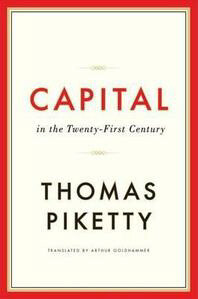hankyoreh
Links to other country sites 다른 나라 사이트 링크
Bank of Korea to see if Piketty‘s capital-income theory applies to South Korea

By Ryu Yi-geun, staff reporter
The Bank of Korea (BOK) plans to release an analysis in late 2014 comparing trends since the 1970s in returns on real estate and other assets with increases in national income. It is part of an effort to see whether the claims of French economist Thomas Piketty, who argues in his popular book, “Capital in the Twenty-First Century” that the higher returns on capital compared to rising earnings predominates at the top of the income distribution in countries like the US and Great Britain, also apply to the South Korean situation.
Cho Tae-hyung, director of the BOK’s Citizen Banking and Services Team, said, “Ever since Piketty‘s book became a bestseller in the U.S., many people have been asking us how the income from capital situation is in South Korea.” Cho explains, “We at BOK need to provide longitudinal data to quantify things, if only so that the debate on wealth inequality proceeds in a rational direction.” The analysis will be separate from another study on South Korean income equality announced by BOK Governor Lee Ju-yeol at a dinner with reporters on June 13.
Piketty, an economics professor at the Paris School of Economics, demonstrates when the rate of return on capital is higher than the rise in national income, it causes wealth to accumulate at the top income levels. In many countries, including the U.S., the highest earners own most of the real estate assets and financial assets such as deposits and stocks. The Bank of Korea aims to test whether the situation described by Piketty applies to South Korea. In order to do this, it is setting up a longitudinal study on capital income since the 1970s and applying Piketty’s methods to find the rate of return on capital. The results are to be announced by the end of the year.
Cho said, “Because there are some areas that require a lot of estimation, rather than being released as official Bank of Korea figures, the data made public will be considered unofficial.”
The study is being made possible thanks to a national balance sheet, published for this first time this past May, which shows the assets and liabilities of the country‘s different economic actors for 2012. The BOK plans to follow up with a long-term study. Economists suggest the BOK’s study of the relationship between the rises in asset returns and national income using the balance sheet will not reveal anything about income inequality among individuals. Demonstrating the country‘s income distribution situation will require additional data from the National Tax Service.
Please direct questions or comments to [english@hani.co.kr]

Editorial・opinion
![[Column] Park Geun-hye déjà vu in Yoon Suk-yeol [Column] Park Geun-hye déjà vu in Yoon Suk-yeol](https://flexible.img.hani.co.kr/flexible/normal/500/300/imgdb/original/2024/0424/651713945113788.jpg) [Column] Park Geun-hye déjà vu in Yoon Suk-yeol
[Column] Park Geun-hye déjà vu in Yoon Suk-yeol![[Editorial] New weight of N. Korea’s nuclear threats makes dialogue all the more urgent [Editorial] New weight of N. Korea’s nuclear threats makes dialogue all the more urgent](https://flexible.img.hani.co.kr/flexible/normal/500/300/imgdb/original/2024/0424/7317139454662664.jpg) [Editorial] New weight of N. Korea’s nuclear threats makes dialogue all the more urgent
[Editorial] New weight of N. Korea’s nuclear threats makes dialogue all the more urgent- [Guest essay] The real reason Korea’s new right wants to dub Rhee a founding father
- [Column] ‘Choson’: Is it time we start referring to N. Korea in its own terms?
- [Editorial] Japan’s rewriting of history with Korea has gone too far
- [Column] The president’s questionable capacity for dialogue
- [Column] Are chaebol firms just pizza pies for families to divvy up as they please?
- [Column] Has Korea, too, crossed the Rubicon on China?
- [Correspondent’s column] In Japan’s alliance with US, echoes of its past alliances with UK
- [Editorial] Does Yoon think the Korean public is wrong?
Most viewed articles
- 1‘We must say no’: Seoul defense chief on Korean, USFK involvement in hypothetical Taiwan crisis
- 2N. Korean delegation’s trip to Iran shows how Pyongyang is leveraging ties with Moscow
- 3[Column] Park Geun-hye déjà vu in Yoon Suk-yeol
- 4Amnesty notes ‘erosion’ of freedom of expression in Korea in annual human rights report
- 5‘Weddingflation’ breaks the bank for Korean couples-to-be
- 646% of cases of violence against women in Korea perpetrated by intimate partner, study finds
- 7[Reportage] On US campuses, student risk arrest as they call for divestment from Israel
- 8“Parental care contracts” increasingly common in South Korea
- 9[Interview] Dear Korean men, It’s OK to admit you’re not always strong
- 10Korean government’s compromise plan for medical reform swiftly rejected by doctors